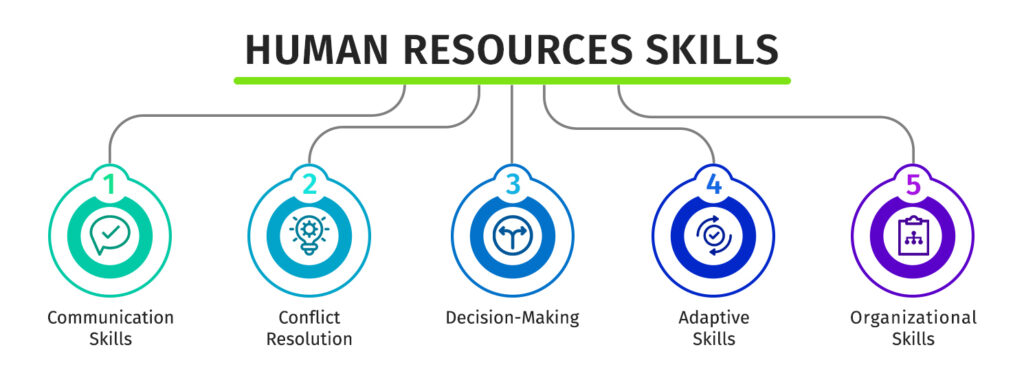Human Resources Best Practices
Human Resource Management Skills: What to Learn
Jennifer Olson
May 02, 2025Human Resource Management (HRM) is the backbone of any successful organization. It’s about more than just hiring and payroll. HR professionals play a major role in creating a positive work environment, managing talent, and ensuring that a company’s goals align with the needs of its workforce. For anyone considering a career in HR or wanting to improve their management style, understanding the essential Human Resource Management skills is crucial.
This blog will explore the core skills every HR professional should master and how developing these abilities can benefit both individuals and organizations.
What Is Human Resource Management?
Human Resource Management is the practice of recruiting, hiring, deploying, and managing an organization’s employees. HR professionals are responsible for a wide range of functions, including:
- Recruitment and staffing
- Training and development
- Performance management
- Employee relations
- Compensation and benefits
- Legal compliance
To do this effectively, HR managers need a specific set of skills that go beyond technical expertise.
Top Human Resource Management Skills
1. Communication
Why it matters:
Communication is at the heart of HRM. HR professionals must be able to clearly convey information to employees, management, and external partners—whether it’s about company policies, benefits, or performance feedback.
How to improve:
- Practice active listening.
- Tailor your communication style to your audience.
- Use clear, concise language in both written and verbal communication.
2. Conflict Resolution
Why it matters:
Workplace conflicts are inevitable. Effective HR managers know how to handle disagreements fairly and diplomatically, helping to resolve issues quickly before they escalate.
How to improve:
- Stay neutral and avoid taking sides.
- Encourage open dialogue between parties.
- Focus on solutions rather than blame.
3. Organizational Skills
Why it matters:
HR professionals juggle multiple tasks—recruitment, onboarding, payroll, compliance—with strict deadlines. Keeping everything organized ensures nothing falls through the cracks.
How to improve:
- Use project management tools.
- Prioritize tasks by urgency and importance.
- Keep accurate records and documentation.
4. Decision-Making
Why it matters:
From selecting the right candidate to enforcing company policies, HR managers face tough decisions every day. Good judgment is essential to strike a balance between organizational needs and employee welfare.
How to improve:
- Gather all relevant information before making a decision.
- Consider both short-term and long-term consequences.
- Consult with others when unsure.
5. Empathy
Why it matters:
HR isn’t just about policies—it’s about people. Understanding employees’ perspectives builds trust and helps in addressing their concerns effectively.
How to improve:
- Put yourself in others’ shoes.
- Show genuine interest in employees’ well-being.
- Be approachable and available for support.
6. Negotiation
Why it matters:
Whether it’s salary discussions or conflict resolution, HR managers often act as mediators. Strong negotiation skills help ensure fair outcomes for everyone involved.
How to improve:
- Prepare thoroughly before negotiations.
- Aim for win-win solutions.
- Remain calm and professional under pressure.
7. Adaptability
Why it matters:
The workplace is constantly evolving—new laws, technologies, and workforce trends require HR managers to be flexible and open to change.
How to improve:
- Stay updated on HR trends.
- Embrace new technologies and systems.
- Be willing to adjust processes as needed.
8. Ethical Judgment
Why it matters:
HR professionals handle sensitive information and must uphold high ethical standards. This includes confidentiality, fairness, and compliance with legal requirements.
How to improve:
- Follow company policies and legal guidelines.
- Treat all employees equally.
- Speak up if you witness unethical behavior.
Why Are HRM Skills Important?
Strong HRM skills bring many benefits:
- Better Employee Engagement: Good communication and empathy keep employees motivated and loyal.
- Reduced Turnover: Effective recruitment and conflict management lead to higher employee retention.
- Legal Compliance: Being organized and ethical reduces the risk of legal problems.
- Improved Productivity: A positive work environment helps everyone perform at their best.
- Support Company Growth: Skilled HR teams help organizations adapt quickly to changes in the business landscape.
How to Develop Human Resource Management Skills
Formal Education
Many HR professionals have degrees in human resources, business administration, or related fields. Certifications like SHRM-CP or PHR add credibility and deepen knowledge.
On-the-job Experience
Nothing beats hands-on experience. Volunteering for cross-functional projects or shadowing experienced HR managers provides valuable insights into real-world challenges.
Continuous Learning
HR laws and best practices are always evolving. Attending workshops, webinars, or online courses helps HR professionals stay current.
Networking
Joining professional organizations or networking groups connects you with peers who can share advice and best practices.
The Changing Landscape of HRM
Technology is transforming HR like never before. Automation handles repetitive tasks, freeing up time for more strategic work. Data analytics helps HR managers make better decisions about hiring, training, and retention. Remote work has made communication and adaptability even more important.
Soft skills—like empathy, communication, and adaptability—are just as critical as technical knowledge in this changing environment.
Common Challenges Faced by HR Managers
1. Handling Workplace Diversity
A diverse workforce brings unique perspectives but also potential misunderstandings. HR managers need cultural competence to navigate these challenges.
2. Navigating Legal Complexities
Employment laws are complex and vary by region. Staying compliant is a constant challenge that requires ongoing learning.
3. Managing Change
Whether it’s a company merger or new technology rollout, HR managers must guide employees through transitions smoothly.
Final Thoughts
Human Resource Management skills are vital for building strong organizations where employees feel valued, motivated, and productive. From communication and conflict resolution to adaptability and ethical judgment, these skills help HR professionals navigate the complexities of today’s workplace.
Investing in developing these abilities benefits not only your career but also your entire organization. Whether you’re new to HR or a seasoned manager, there’s always room to grow—and your team will thank you for it.
All Tags
